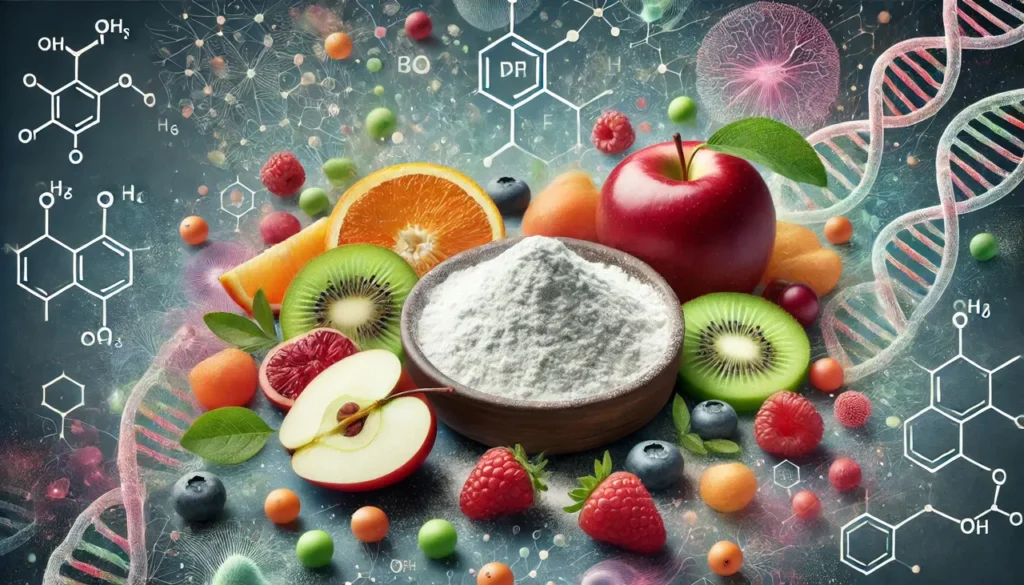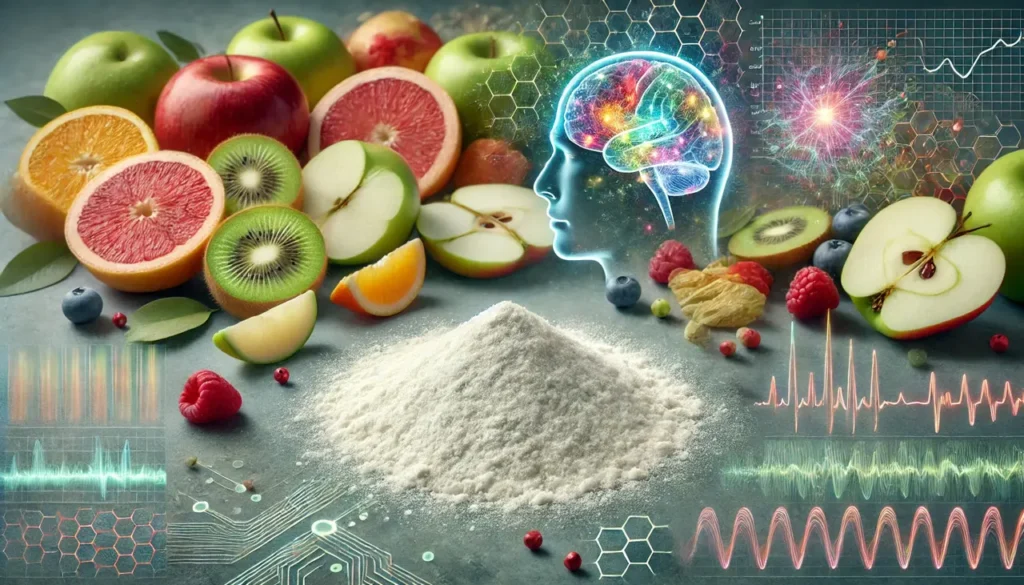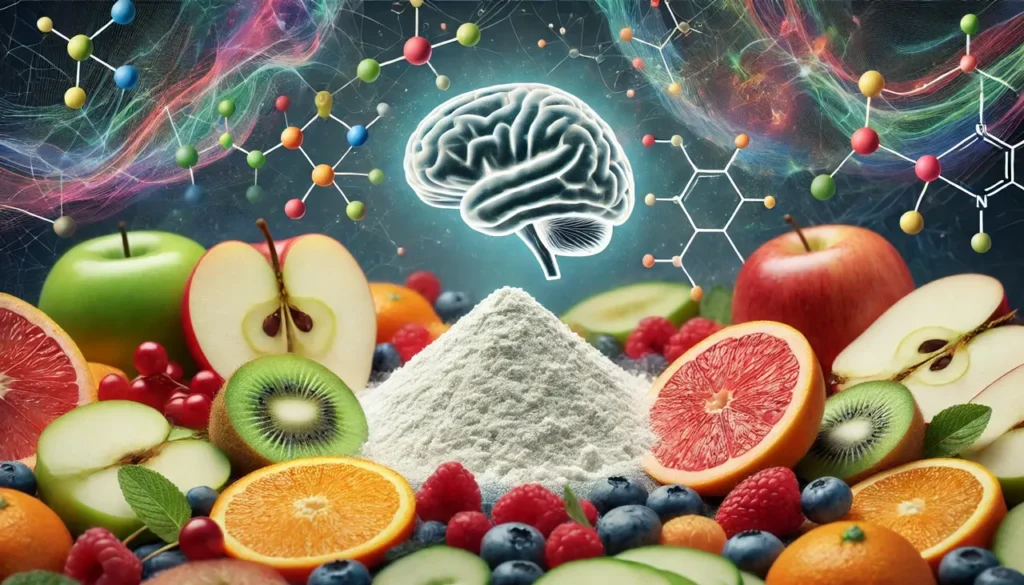Pectin, a complex polysaccharide primarily found in the cell walls of fruits, is commonly known for its role in food preparation, particularly as a gelling agent in jams and jellies. However, emerging research suggests that pectin may offer more than culinary benefits, with potential applications in health and wellness, including its role as a nootropic supplement. While pectin is not traditionally associated with cognitive enhancement, its impact on gut health, inflammation reduction, and metabolic regulation can indirectly benefit brain function.
This article explores pectin’s potential nootropic benefits, providing a detailed analysis of its sources, chemistry, physiological mechanisms in the body and brain, dosing guidelines, side effects, drug interactions, and safety considerations for its use as a supplement.
You May Also Like:
Sources of Pectin
Pectin is a naturally occurring substance found in the cell walls of many fruits, especially in apples and citrus fruits. The primary food sources of pectin include:
- Fruits: Apples, oranges, lemons, grapefruits, and berries are particularly rich in pectin.
- Vegetables: Although less common, some vegetables like carrots and tomatoes contain small amounts of pectin.
- Dietary supplements: Pectin is available as a powder or capsule supplement, often derived from citrus fruits or apples for its health benefits.
Pectin’s primary role in plants is to provide structural integrity and resistance against pathogens. As a dietary fiber, pectin is also used in various food products to enhance texture and stability.

Chemistry of Pectin
Pectin is a heteropolysaccharide consisting of galacturonic acid units linked by α-(1→4) glycosidic bonds with varying degrees of methylation. The chemical structure of pectin is categorized based on the degree of esterification (DE):
- High-methoxyl pectin: Contains a high degree of methyl-esterified galacturonic acid residues, typically used for gelling purposes in food processing.
- Low-methoxyl pectin: Contains fewer esterified residues and forms gels in the presence of calcium ions, often used in low-sugar or sugar-free products.
The variation in pectin structure and its degree of methylation can influence its solubility and interaction with other molecules, making it useful not only in food science but also in potential therapeutic applications.

Physiological Mechanisms of Pectin in the Body and Brain
Although pectin’s nootropic potential is less direct than other supplements like omega-3 fatty acids or Ginkgo biloba, it exerts beneficial effects on brain function through its role in improving gut health, reducing inflammation, and regulating metabolic processes. The following physiological mechanisms outline how pectin can influence brain function:
- Gut-Brain Axis and Microbiome Modulation: Pectin is a soluble fiber that resists digestion in the upper gastrointestinal tract and reaches the colon, where it is fermented by beneficial gut bacteria. This fermentation process produces short-chain fatty acids (SCFAs), such as butyrate, acetate, and propionate, which play a key role in maintaining gut barrier integrity and reducing inflammation. SCFAs are known to influence brain function by modulating the gut-brain axis, improving mood, and enhancing cognitive function.
- Anti-Inflammatory Effects: Chronic inflammation is associated with cognitive decline and neurodegenerative diseases such as Alzheimer’s disease. Pectin has been shown to reduce systemic inflammation by modulating immune responses and suppressing the production of pro-inflammatory cytokines. By reducing inflammation, pectin may help protect brain cells from damage and improve overall cognitive function.
- Blood Sugar Regulation: Pectin’s ability to slow the absorption of sugars in the digestive tract helps regulate blood glucose levels, preventing spikes and crashes that can negatively affect cognitive performance. Stable blood sugar levels are essential for maintaining optimal brain function, particularly in individuals with metabolic disorders such as diabetes.
- Neuroprotection: Although not directly linked to the brain, pectin’s antioxidant properties contribute to its neuroprotective potential. By neutralizing free radicals and reducing oxidative stress, pectin may protect neurons from damage, supporting cognitive health over the long term.
- Cholesterol and Cardiovascular Health: Pectin has been shown to reduce LDL cholesterol levels by binding to bile acids in the intestine, which are then excreted. This cholesterol-lowering effect not only supports cardiovascular health but also enhances blood flow to the brain, ensuring that neurons receive sufficient oxygen and nutrients for optimal function.

Nootropic Benefits of Pectin
Given its influence on gut health, inflammation, and metabolic regulation, pectin can be considered a supportive nootropic supplement. While it may not provide the immediate cognitive boosts associated with conventional nootropics, its long-term benefits for brain health are significant:
- Cognitive Clarity and Focus: Pectin’s role in stabilizing blood sugar levels prevents the cognitive fog associated with hypoglycemia. By maintaining steady energy levels, pectin may help improve focus and mental clarity, particularly in individuals prone to blood sugar fluctuations.
- Mood Regulation: Through its impact on the gut-brain axis and its ability to support a healthy gut microbiome, pectin may influence the production of neurotransmitters such as serotonin, which is crucial for mood regulation. A healthy gut environment can reduce symptoms of anxiety and depression, improving overall cognitive performance and emotional well-being.
- Neuroprotection and Cognitive Longevity: Pectin’s antioxidant and anti-inflammatory properties may protect against neurodegenerative diseases and cognitive decline. By reducing oxidative stress and chronic inflammation, pectin supports long-term cognitive health, potentially delaying the onset of conditions such as Alzheimer’s disease.
- Gut Health and Brain Function: Pectin’s prebiotic effects promote the growth of beneficial gut bacteria, producing compounds that positively affect brain function. A balanced gut microbiome has been linked to improved memory, learning, and stress resilience.

Dosage and Supplementation Guidelines
While pectin is commonly consumed through food sources, individuals seeking to use pectin for its health benefits may turn to supplementation. Here are some guidelines on dosage:
- Dietary Intake: Consuming pectin through fruits like apples and citrus is the most natural way to incorporate this fiber into your diet. A daily intake of 5-15 grams of dietary fiber, with a portion of that coming from pectin, is generally recommended for overall health benefits, including cognitive support.
- Supplemental Dosage: Pectin supplements are available in powder or capsule form. Typical doses range from 2 to 6 grams per day, depending on the intended use. For gut health and cholesterol regulation, a dose of 10-15 grams per day may be effective, but those looking to improve cognitive function through the gut-brain axis may benefit from lower doses within the 2-6 gram range.
- Form of Supplement: Pectin supplements come in different forms, including high-methoxyl and low-methoxyl pectin. Low-methoxyl pectin is often preferred for those on a low-sugar diet, as it does not require sugar to form gels.

Side Effects and Safety
Pectin is generally recognized as safe (GRAS) and is well tolerated by most individuals when consumed in typical dietary amounts. However, like any supplement, pectin can cause side effects in certain populations:
- Gastrointestinal Issues: Pectin is a soluble fiber that can cause bloating, gas, or diarrhea in individuals not accustomed to high-fiber diets. starting with a lower dose and gradually increasing intake while ensuring adequate water consumption is advisable.
- Allergic Reactions: Although rare, some individuals may experience allergic reactions to pectin, especially if it is derived from citrus fruits. Symptoms may include itching, swelling, or difficulty breathing. Individuals with known fruit allergies should consult a healthcare provider before taking pectin supplements.
- Blood Sugar Effects: While pectin’s role in regulating blood sugar is generally beneficial, individuals taking medications for diabetes or those prone to hypoglycemia should monitor their blood glucose levels when supplementing with pectin.
Interactions with Other Supplements and Medications
Pectin is unlikely to cause significant interactions with most supplements or medications. However, there are some important considerations to keep in mind:
- Cholesterol-Lowering Medications: Pectin can enhance the effects of cholesterol-lowering medications such as statins. While this may be beneficial for individuals looking to reduce LDL cholesterol, it is important to monitor cholesterol levels to avoid excessive reductions.
- Blood Sugar Medications: Pectin may lower blood sugar levels, potentially enhancing the effects of diabetes medications such as insulin or metformin. Individuals with diabetes should consult their healthcare provider before taking pectin supplements to avoid hypoglycemia.
- Fiber Supplements: Combining pectin with other fiber supplements may result in excessive fiber intake, leading to digestive discomfort. It is important to balance fiber intake from different sources and adjust doses accordingly.
Risks for Individuals with Certain Health Conditions
While pectin is safe for most people, certain individuals should use caution when incorporating pectin into their diets or supplement routines:
- Diabetes: Pectin’s ability to lower blood sugar levels can be beneficial for individuals with diabetes, but it may also increase the risk of hypoglycemia, particularly when combined with medications. Blood sugar levels should be carefully monitored, and pectin supplementation should be discussed with a healthcare provider.
- Gastrointestinal Disorders: Individuals with certain gastrointestinal conditions, such as irritable bowel syndrome (IBS) or inflammatory bowel disease (IBD), may experience exacerbated symptoms from high-fiber intake. Those with sensitive digestive systems should introduce pectin gradually and monitor their response.
- Allergies: People with known allergies to citrus fruits or apples should avoid pectin supplements derived from these sources to prevent allergic reactions.

Conclusion: Should You Consider Pectin as a Nootropic?
Pectin may not be a traditional nootropic, but its effects on gut health, inflammation, and metabolic regulation indirectly support cognitive function. By improving gut-brain communication, reducing systemic inflammation, and stabilizing blood sugar levels, pectin offers long-term benefits for brain health, particularly regarding memory, focus, and cognitive longevity.
Incorporating pectin into your diet through natural food sources or supplements can be a simple and effective way to promote overall health, including cognitive function. However, as with any supplement, it is important to consult with a healthcare provider, particularly if you have pre-existing health conditions or are taking medications that may interact with pectin. By using pectin responsibly, individuals can enjoy its broad spectrum of benefits, from improved digestion to enhanced cognitive resilience.

References:
- 10 Promising Benefits and Uses of Apple Pectin. Retrieved from: https://www.healthline.com/nutrition/apple-pectin
- What Is Pectin? A Unique Fiber Explained. Retrieved from: https://www.healthline.com/nutrition/pectin
- Pectin: A Bioactive Food Polysaccharide with Cancer Preventive Potential. Retrieved from: https://pmc.ncbi.nlm.nih.gov/articles/PMC9657392/
- The effects of different dietary fiber pectin structures on the gastrointestinal immune barrier: impact via gut microbiota and direct effects on immune cells. Retrieved from: https://www.nature.com/articles/s12276-020-0449-2
- What Is Fruit Pectin and What Does It Do for You? Retrieved from: https://www.medicinenet.com/what_is_fruit_pectin_and_what_does_it_do_for_you/article.htm
- Apple Pectin: A Source of Prebiotics and Soluble Fiber. Retrieved from: https://www.verywellhealth.com/the-benefits-of-apple-pectin-89599
Important Note: The information contained in this article is for general informational purposes only, and should not be construed as health or medical advice, nor is it intended to diagnose, prevent, treat, or cure any disease or health condition. Before embarking on any diet, fitness regimen, or program of nutritional supplementation, it is advisable to consult your healthcare professional in order to determine its safety and probable efficacy in terms of your individual state of health.
Regarding Nutritional Supplements Or Other Non-Prescription Health Products: If any nutritional supplements or other non-prescription health products are mentioned in the foregoing article, any claims or statements made about them have not been evaluated by the U.S. Food and Drug Administration, and such nutritional supplements or other health products are not intended to diagnose, treat, cure, or prevent any disease.


